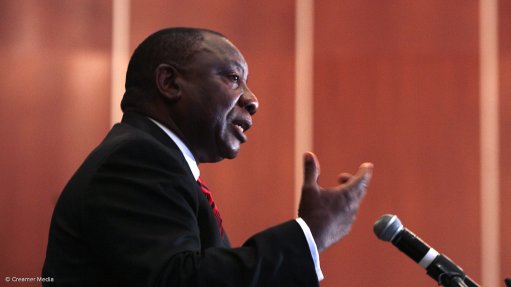
Deputy President Cyril Ramaphosa
Photo by: Duane Daws
A lack of access to electricity precluded Africa from fully participating in the Fourth Industrial Revolution, and private sector investment in power generation was key to spurring Africa’s growth.
Speaking during a session called “Powering Africa”, at the forty-seventh Annual Meeting of the World Economic Forum in Davos, Switzerland, South African Deputy President Cyril Ramaphosa said: “In the past, we’ve relied on governments to power our countries; we now need to bring in the private sector to help empower our economies and people.”
Estimates are that closing the energy gap on the African continent, where half of all people do not have access to electricity, would result in 30% higher economic growth by 2040.
According to the discussion panel, the energy gap loomed large as the major obstacle to Africa’s advancement. More than 600-million people in Africa lacked access to clean, affordable, reliable energy.
“We’re tired of seeing Africa in the dark,” said Akinwumi Ayodeji Adesina, president of the African Development Bank (AfDB).
The AfDB was helping address structural problems in the lack of base-load power by investing $12-billion on the power sector over five years, he said.
The panel agreed that energy and energy reform was becoming a crucial part of electioneering in Africa, with the message to the continent’s leaders being that if they wanted to stay in power, they had to deliver power.
“The good news is that it is technologically feasible to provide affordable, reliable, clean power to people who haven’t had access to power before,” said Rachel Kyte, Special Representative of the Secretary-General and CEO, United Nations.
She added that Africa was the crucible of innovation in providing off-grid solutions.
However, financing models also needed innovation, said Aliko Dangote, President and CE of Dangote Industries in Nigeria. “Issues such as high interest rates and unstable currencies make it difficult for private-sector funding to flow.”
The forty-seventh World Economic Forum Annual Meeting is taking place over three days under the theme “Responsive and Responsible Leadership”, drawing over 3 000 participants from around the world.